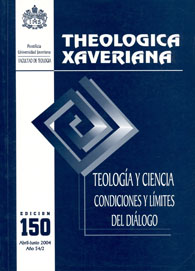Abstract
La ciencia y la teología coinciden en la necesidad de explicar la creación del universo y la fundamentación ética. Los métodos difieren: en uno se recurre a la fe; en el otro a la hipótesis metafísica de la existencia de leyes en la naturaleza. Aceptar la creación del mundo por acto de Dios externo al universo puede ser para la mente humana tan fácil o difícil como entender que todo el cosmos, con la información necesaria para su desarrollo, estuviera concentrado en un espacio de tamaño varias órdenes de magnitud inferior al de un protón.This journal is registered under a Creative Commons Attribution 4.0 International Public License. Thus, this work may be reproduced, distributed, and publicly shared in digital format, as long as the names of the authors and Pontificia Universidad Javeriana are acknowledged. Others are allowed to quote, adapt, transform, auto-archive, republish, and create based on this material, for any purpose (even commercial ones), provided the authorship is duly acknowledged, a link to the original work is provided, and it is specified if changes have been made. Pontificia Universidad Javeriana does not hold the rights of published works and the authors are solely responsible for the contents of their works; they keep the moral, intellectual, privacy, and publicity rights.
Approving the intervention of the work (review, copy-editing, translation, layout) and the following outreach, are granted through an use license and not through an assignment of rights. This means the journal and Pontificia Universidad Javeriana cannot be held responsible for any ethical malpractice by the authors. As a consequence of the protection granted by the use license, the journal is not required to publish recantations or modify information already published, unless the errata stems from the editorial management process. Publishing contents in this journal does not generate royalties for contributors.


